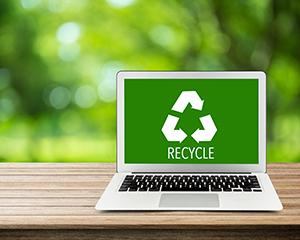Laptop Recycling for Beginners!

Featured Image: iStock.com/narith_2527
They say old is gold. Well, there isn’t much to argue about because even a tech geek can extract a lot of valuable stuff out of his old, worn out, computers and laptops. Once a laptop stops working, it is discarded in a regular bin. Those who opt for the careless option, not only choose to harm the environment but also lose a good opportunity to minimize the need for the continuous production of virgin resources.
Laptop Disposal and Recycling
There are various laptop manufacturers and each of them assembles this electronic device in a unique way. Therefore, it’s not possible to provide guidelines for individuals interested in removing specific parts nor is there any use of keeping old parts for future use because they won’t fit in the upgraded models. You can search for the laptop recycling methods or the online manual of the manufacturer, though. There may actually be some video tutorials available that can teach you how to access the useful material inside a laptop. In addition, it’s mandatory to follow standardized hard drive disposal procedures to set the seal on data cleaning before recycling.
Parts that should be disposed in a laptop:
Power supplies, Battery packs, and LCDs are the most sensitive parts which cost almost as high as purchasing a new product. LCDs especially should not be dumped just like that. They need to be properly disposed by individuals and corporations.
If the device or any part of it is broken then it is wiser to dispose them off rather than getting it repaired. It will also be wastage of time if you try to sell them off in the market. Similarly, don’t get them trashed either because they pose a threat to our environment. Instead, send them to a professional recycling facility such as Hummingbird international.
Benefits of laptop recycling:
A laptop owner not only shows a sense of responsibility by contacting a registered recycler; he also adheres to the state law by doing it. Apart from the obvious monetary and environmental benefits, here are some other pointers you should keep in mind.
• Keeps the budget in check:
Many parts of your laptop are reusable even after being worn out. Things like your lappy’s RAM, CMOS battery, and optical drive can be reused with external USB enclosures or kept as backups for times of emergency.
• Cashing in on your device:
Even broken laptops contain many valuable parts. If you can identify those parts, you can sell them off to earn some extra cash. If you simply want to replace your system, consider upgrading it. You can also replace certain parts and sell off the unwanted ones.
• How to choose a company for laptop recycling?
As the need and awareness grow, many firms are springing up to handle the situation. Problem is, not all of them are registered or qualified enough to deal with this decently. They neither provide secure destruction of sensitive data nor an easy process for the convenience of the customers.
To choose the most appropriate recycling service contractor, here is what you need to know:
• Check the list of available recycling vendor in your area.
• Find the one who is certified and recognized by the State.
• Check for the one providing an easy process. Some companies provide free pick and drop service to collect your e-waste.
Laptop recycling is important and it’s time we took the electronic waste issue seriously. What is your company’s stance on this issue? Please drop your comments and suggestion in the space given below.
About The Author Kelly Sampson
Kelly Sampson is a writer, blogger, and environmental enthusiast. She has strong opinions about climate change, the dogs vs. cats debate, and Oxford commas. She has lent Hummingbird International her engaging and spirited voice and turned our blog into a great place to find valuable information about e-waste, e-waste recycling, and the ITAD industry. Explore our blog to read more of her work.






